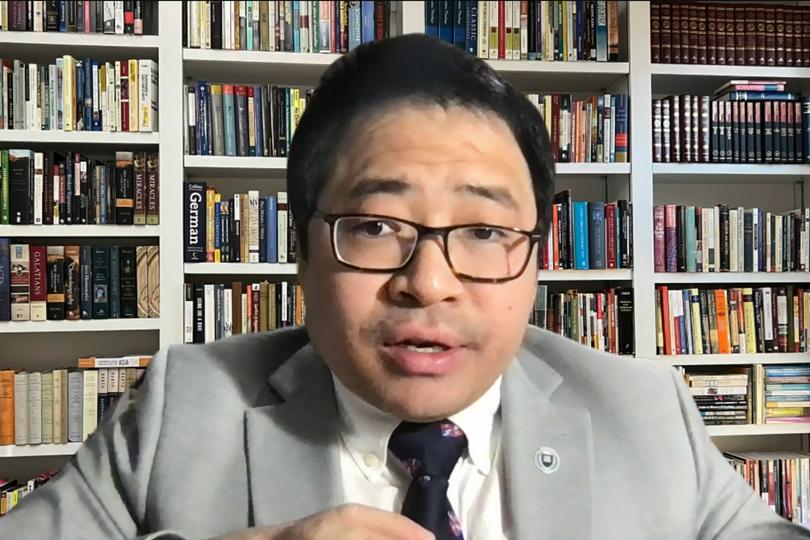On February 5, an online book launch was held to celebrate the release of Dr. David Moe's latest work, Beyond the Academy: Lived Asian Public Theology of Religions, which argues that public theology must move beyond academic discourse to engage with grassroots Christian communities, particularly in Asia.
The event was co-hosted by the Christian Studies program at the National University of Singapore, the Divinity School of Chung Chi College at the Chinese University of Hong Kong, and the Yale MacMillan Center’s Council on Southeast Asia Studies.
In his presentation, Dr. David Moe, postdoc associate and lecturer in Religion and Conflict in Southeast Asia, Yale University, review editor of International Journal of Public Theology, and co-chair of Religion in Southeast Asia Unit at American Academy of Religion, began by commemorating the 50th anniversary of the term "public theology," first introduced by Martin E. Marty in 1974. He noted that while the concept has gained significant traction in academic circles over the decades, it has often failed to engage meaningfully with the lived realities of grassroots Christian communities. This disconnect, he argued, has created an "external crisis" for public theology, as its relevance to the everyday lives of ordinary people remains limited. For Dr. Moe, public theology must transcend the academic ivory tower, stepping into the local, lived experiences of Christian communities to remain impactful and pertinent to real-world concerns.
Dr. Moe then shifted the focus to the unique context of Asian public theology, emphasizing the importance of taking into account not only broad regional perspectives but also the micro-contexts that shape the faith and practices of individual communities. Drawing from his own experiences, he recounted his journey from a Sunday school student to a teacher in his small village in Myanmar. Therefore, he dedicated his book to his village Presbyterian church as an expression of gratitude for the wisdom, struggles, and contributions of grassroots Christians who shaped his theological journey.
Elaborating on why public theology must go beyond the academy, Dr. Moe identified two key limitations of the current discourse. First, he questioned whether public theology, as it is currently practiced, truly serves the needs of ordinary people. By remaining confined to academic discussions among scholars, public theology risks becoming an abstract exercise and cannot adequately address real-world issues such as social justice, religious conflict, and cultural identity. Second, he pointed out the flourishing of Christianity among grassroots communities across Asia, despite challenges such as persecution, poverty, and suffering. These communities, he explained, are already embodying public theology in their daily lives, even if they do not explicitly use the term. By listening to and learning from these communities, scholars can enrich and validate the discipline, ensuring that public theology is grounded in lived faith rather than abstract theory.
To further clarify his approach, Dr. Moe outlined the structure of his book, which he designed to facilitate a paradigm shift in Asian public theology. The book is divided into five chapters, each contributing to a holistic framework for engaging with grassroots communities. It explores the motivations, methods, and ethnographic insights from Myanmar while revisiting the Asian public theology of religions and liberation through addressing contemporary issues like religious nationalism and ethnic conflict. The final chapter synthesizes academic and grassroots perspectives on salvation, aiming to make public theology more relevant and transformative.
Following Dr. Moe’s presentation, a panel of scholars expanded on the themes of the book.
Andrew Peh, a graduate of Asbury Theological Seminary and lecturer at Trinity Theological College, highlighted the transformative potential of Dr. Moe’s approach to public theology. Emphasizing the need to move beyond the academic "echo chamber," Peh noted that public theology must engage directly with the broader Christian community.
Yex Nang Shwe Rong (Nancy), a doctoral candidate specializing in feminist political theology at the Divinity School of Chung Chi College, the Chinese University of Hong Kong, focused on the critical role of women in public theology. She emphasized that women’s voices are often overlooked in theological discourse and called for greater attention to how women’s experiences can challenge and enrich traditional understandings of public theology.
Father Francis Vincent, professor emeritus of practical theology at the Salesian Pontifical University in Rome, Italy, praised the empirical methodology employed in Dr. Moe’s book. Vincent emphasized how Dr. Moe’s engagement with grassroots communities—through interviews and direct interaction—adds authenticity and depth to public theology.
The Q&A session that followed probed into a range of topics raised by the audience. Regarding climate change, Dr. Moe suggested that indigenous religions could play a vital role in creating care, challenging the negative perceptions often associated with them. He argued that traditional knowledge and practices rooted in indigenous religions can contribute significantly to ecological sustainability. Addressing the inclusion of women’s voices, Dr. Moe acknowledged the role women play in public theology, noting that five women were included in his interviews. On the distinction between Buddhism and Christianity in Myanmar, he challenged the notion that Buddhism is the native religion of the region, arguing that both Buddhism and Christianity are foreign imports. This perspective, he explained, seeks to promote religious equality and challenge nationalistic narratives that favor one religion over another.












